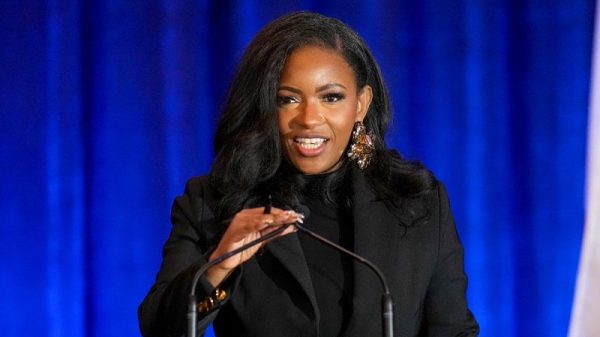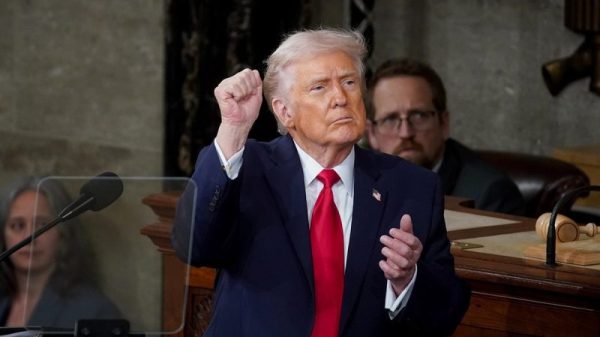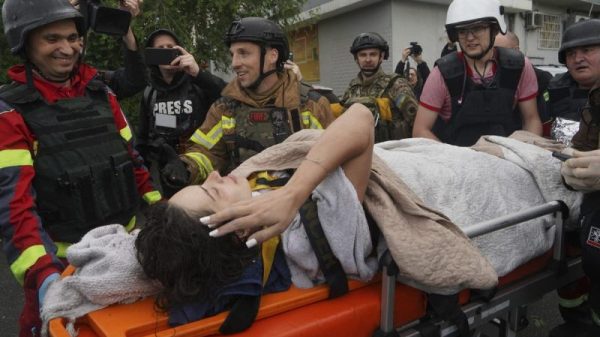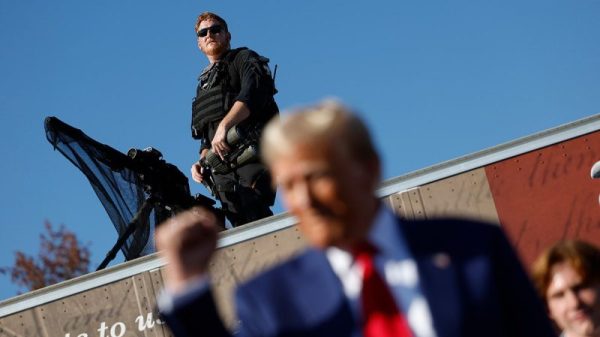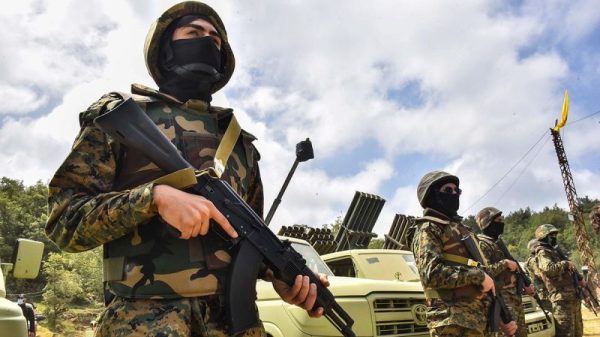Donald Trump’s campaign argues that Joe Biden is a feeble incompetent — disconnected from reality as his aides shuttle him around the world, in the words of one Trump adviser, like the cadaver in the 1989 comedy film “Weekend at Bernie’s.”
Biden’s campaign describes Trump as an “unhinged” extremist with dictatorial designs who “snapped” when he lost the 2020 election, forfeiting the ability to do anything other than focus on growing his own power.
The two caricatures — built on selective editing, blasted out by well-funded electoral machines and amplified through partisans on social media — have come to define the early months of the general election, giving voters on both sides of the spectrum punching bags for their discontent.
But for the population of voters likely to decide the election — a group that dislikes the choice and wants neither man to return to office — the cacophony of recrimination has done little to clarify the choice.
Thursday’s presidential debate in Atlanta will, among other things, offer both men a rare chance to prove their opponents wrong in real time, as they stand together onstage, without edits, before what promises to be an enormous national audience. Voters who get to make the final call in the voting booth will be offered a 90-minute window into what is real and what is spin about their major-party choices.
Aware of the stakes, advisers to both candidates have been preparing their bosses to avoid traps set by their opponents. Biden’s aides hope to present a vigorous president — in command of the issues, able to take Trump on directly and explain to the American people his own accomplishments in office. Trump’s advisers have been coaching their candidate to focus on the issue advantages in the polls, reaffirming the image as a tough businessman ready to disrupt Washington that got him elected in 2016.
“If the former president focuses on those issues that Americans care about, immigration, crime, big pocketbook issues, inflation … he’s victorious,” said David Urban, a former Trump campaign adviser and GOP strategist. “If he focuses on the past election, personal grievance, I think those things probably won’t serve him as well.”
Others have been even more explicit in their definition of Trump’s goal for the event, which is to downplay the irascible and explosive leader that Biden describes.
“I think what Donald Trump wants to do is make this about issues and why he was a better president than Joe Biden was and will be a better president again,” said Trump’s longtime pollster Jim McLaughlin. “It’s about a vision. He can give a lot of examples and real-life stories about how he brought peace to the Middle East, brought inflation down, secured the border and kept people safe.”
Kate Bedingfield, a former communications adviser to Biden, agreed that Trump’s most obvious path was to try to avoid the explosive outbursts that tarred him after their first meeting in the 2020 campaign. The Biden operation will be ready for the shift, she said, and can overcome it by Biden appearing aggressive.
“For Biden, the goal is to be on offense and driving Trump to his biggest vulnerabilities,” she said. “There is every expectation that the disciplined Trump shows up, but even if that is the case the opportunity for Biden is huge.”
The stakes have led both campaigns to take extraordinary measures in hopes that their candidate will play against type. Biden’s coterie of advisers have undertaken a deliberate and extensive process at Camp David to prepare the president to overperform expectations, as he did in this year’s State of the Union address, to demonstrate his command of the issues and the office that he holds. Trump advisers, faced with a candidate less interested in debate preparation, have repeatedly tried to emphasize that the former president’s top priority is to highlight his difference with Biden on issues such as inflation and immigration.
The structure of the confrontation could also help determine its outcome. Both Trump and the moderators at CNN have accepted Biden’s terms for the meeting: There will be no studio audience, two commercial breaks and microphones that immediately shut off when a candidate does not have the floor.
At stake is not just possible movement in the polls, which have shown some slight improvement for Biden since Trump’s felony convictions in New York. Both campaigns also hope to use the event as a chance to engage directly with voters, hoping to yield both campaign donations and, in the case of the Biden campaign, a resurgence in volunteer energy.
The debate will be aired across major broadcast and cable channels, with CBS, ABC, NBC, FOX, PBS, Univision channels and other cable news networks planning to take the event live at 9 p.m. Eastern time. The moderators are CNN anchors Jake Tapper and Dana Bash.
Republican National Committee Chairman Michael Whatley and co-chair Lara Trump are hosting a watch party and fundraiser the night of the debate, which will include several potential vice-presidential contenders. According to an invitation obtained by The Washington Post, Trump may deliver post-debate remarks.
The Biden campaign on Sunday announced plans for 300 debate watch parties and more than 1,600 events this week across targeted states. Some of those events are organized around the two-year anniversary Monday of the Supreme Court’s decision to overturn the constitutional right to abortion, a move that was made possible by Trump’s three appointments to the court.
The Biden campaign has also increased its spending on television and digital ads in the run-up to the debate, spending more than twice as much in mid-June as it spent in mid-May, according to AdImpact. Total spending last week was nearly $9.2 million, according to AdImpact, compared with almost no spending by the Trump campaign.
Biden has sequestered himself since Thursday with nearly all of his senior team at the presidential retreat at Camp David to prepare. Among those present are former White House counsel Bob Bauer, who played Trump in 2020 debate prep sessions, and former chief of staff Ron Klain, who has led Democratic nominee debate prep sessions for decades.
In total, 16 senior White House and campaign officials are expected to join him before he departs for the debate Thursday, including current chief of staff Jeff Zients, message and polling guru Mike Donilon, national security adviser Jake Sullivan and campaign chair Jen O’Malley Dillon, Biden advisers said.
Trump has been warming up in public, addressing both a Philadelphia arena rally Saturday and a gathering of Christian conservatives at a conference in Washington.
Trump mocked Biden for taking time to prepare and the moderators he will face. “He’s sleeping now because they want to get him good and strong,” Trump said in Philadelphia. “Think of it. There is no audience. It’s like death.”
Trump also asked supporters at the rally how he should handle Biden, suggesting he may not have fully embraced the advice of his campaign team. “Should I be tough and nasty and just say, ‘You’re the worst president in history,’ or should I be nice and calm and let him speak?” Trump asked. He laughed when a member of the audience suggested a “50/50” approach, and then answered his own question: “Be tough. Be tough.”
The Trump team in recent weeks has opted for more informal policy sessions with different outside supporters, according to people familiar with the planning. Sens. J.D. Vance (R-Ohio), Marco Rubio (R-Fla.), and Bill Hagerty (R-Tenn.) are among those who have helped Trump in preparing. Vance participated in a session about the economy, according to a person familiar with the meeting, who like others spoke on the condition of anonymity because they were not authorized to speak publicly.
The approach reflects the challenges Trump advisers have had in past elections trying to get Trump to sit for conventional debate preparations. People involved in the sessions before the first debate of the 2020 cycle have described it as a chaotic environment, with little rehearsal actually taking place. The campaign has adopted the position this year that traditional prep is not needed.
“President Trump takes on numerous tough interviews every single week and delivers lengthy rally speeches while standing, demonstrating elite stamina,” Trump senior adviser Jason Miller said in a statement. “He does not need to be programmed by staff.”
But there are signs that Trump was moving away from the doddering caricature he has long tried to paint about his opponent. In a recent interview on the “All-In” podcast, the former president took a different tone.
“I assume he’s going to be somebody that will be a worthy debater,” Trump said on the podcast. “I don’t want to underestimate him.”
Donald Trump’s campaign argues that Joe Biden is a feeble incompetent — disconnected from reality as his aides shuttle him around the world, in the words of one Trump adviser, like the cadaver in the 1989 comedy film “Weekend at Bernie’s.”
Biden’s campaign describes Trump as an “unhinged” extremist with dictatorial designs who “snapped” when he lost the 2020 election, forfeiting the ability to do anything other than focus on growing his own power.
The two caricatures — built on selective editing, blasted out by well-funded electoral machines and amplified through partisans on social media — have come to define the early months of the general election, giving voters on both sides of the spectrum punching bags for their discontent.
But for the population of voters likely to decide the election — a group that dislikes the choice and wants neither man to return to office — the cacophony of recrimination has done little to clarify the choice.
Thursday’s presidential debate in Atlanta will, among other things, offer both men a rare chance to prove their opponents wrong in real time, as they stand together onstage, without edits, before what promises to be an enormous national audience. Voters who get to make the final call in the voting booth will be offered a 90-minute window into what is real and what is spin about their major-party choices.
Aware of the stakes, advisers to both candidates have been preparing their bosses to avoid traps set by their opponents. Biden’s aides hope to present a vigorous president — in command of the issues, able to take Trump on directly and explain to the American people his own accomplishments in office. Trump’s advisers have been coaching their candidate to focus on the issue advantages in the polls, reaffirming the image as a tough businessman ready to disrupt Washington that got him elected in 2016.
“If the former president focuses on those issues that Americans care about, immigration, crime, big pocketbook issues, inflation … he’s victorious,” said David Urban, a former Trump campaign adviser and GOP strategist. “If he focuses on the past election, personal grievance, I think those things probably won’t serve him as well.”
Others have been even more explicit in their definition of Trump’s goal for the event, which is to downplay the irascible and explosive leader that Biden describes.
“I think what Donald Trump wants to do is make this about issues and why he was a better president than Joe Biden was and will be a better president again,” said Trump’s longtime pollster Jim McLaughlin. “It’s about a vision. He can give a lot of examples and real-life stories about how he brought peace to the Middle East, brought inflation down, secured the border and kept people safe.”
Kate Bedingfield, a former communications adviser to Biden, agreed that Trump’s most obvious path was to try to avoid the explosive outbursts that tarred him after their first meeting in the 2020 campaign. The Biden operation will be ready for the shift, she said, and can overcome it by Biden appearing aggressive.
“For Biden, the goal is to be on offense and driving Trump to his biggest vulnerabilities,” she said. “There is every expectation that the disciplined Trump shows up, but even if that is the case the opportunity for Biden is huge.”
The stakes have led both campaigns to take extraordinary measures in hopes that their candidate will play against type. Biden’s coterie of advisers have undertaken a deliberate and extensive process at Camp David to prepare the president to overperform expectations, as he did in this year’s State of the Union address, to demonstrate his command of the issues and the office that he holds. Trump advisers, faced with a candidate less interested in debate preparation, have repeatedly tried to emphasize that the former president’s top priority is to highlight his difference with Biden on issues such as inflation and immigration.
The structure of the confrontation could also help determine its outcome. Both Trump and the moderators at CNN have accepted Biden’s terms for the meeting: There will be no studio audience, two commercial breaks and microphones that immediately shut off when a candidate does not have the floor.
At stake is not just possible movement in the polls, which have shown some slight improvement for Biden since Trump’s felony convictions in New York. Both campaigns also hope to use the event as a chance to engage directly with voters, hoping to yield both campaign donations and, in the case of the Biden campaign, a resurgence in volunteer energy.
The debate will be aired across major broadcast and cable channels, with CBS, ABC, NBC, FOX, PBS, Univision channels and other cable news networks planning to take the event live at 9 p.m. Eastern time. The moderators are CNN anchors Jake Tapper and Dana Bash.
Republican National Committee Chairman Michael Whatley and co-chair Lara Trump are hosting a watch party and fundraiser the night of the debate, which will include several potential vice-presidential contenders. According to an invitation obtained by The Washington Post, Trump may deliver post-debate remarks.
The Biden campaign on Sunday announced plans for 300 debate watch parties and more than 1,600 events this week across targeted states. Some of those events are organized around the two-year anniversary Monday of the Supreme Court’s decision to overturn the constitutional right to abortion, a move that was made possible by Trump’s three appointments to the court.
The Biden campaign has also increased its spending on television and digital ads in the run-up to the debate, spending more than twice as much in mid-June as it spent in mid-May, according to AdImpact. Total spending last week was nearly $9.2 million, according to AdImpact, compared with almost no spending by the Trump campaign.
Biden has sequestered himself since Thursday with nearly all of his senior team at the presidential retreat at Camp David to prepare. Among those present are former White House counsel Bob Bauer, who played Trump in 2020 debate prep sessions, and former chief of staff Ron Klain, who has led Democratic nominee debate prep sessions for decades.
In total, 16 senior White House and campaign officials are expected to join him before he departs for the debate Thursday, including current chief of staff Jeff Zients, message and polling guru Mike Donilon, national security adviser Jake Sullivan and campaign chair Jen O’Malley Dillon, Biden advisers said.
Trump has been warming up in public, addressing both a Philadelphia arena rally Saturday and a gathering of Christian conservatives at a conference in Washington.
Trump mocked Biden for taking time to prepare and the moderators he will face. “He’s sleeping now because they want to get him good and strong,” Trump said in Philadelphia. “Think of it. There is no audience. It’s like death.”
Trump also asked supporters at the rally how he should handle Biden, suggesting he may not have fully embraced the advice of his campaign team. “Should I be tough and nasty and just say, ‘You’re the worst president in history,’ or should I be nice and calm and let him speak?” Trump asked. He laughed when a member of the audience suggested a “50/50” approach, and then answered his own question: “Be tough. Be tough.”
The Trump team in recent weeks has opted for more informal policy sessions with different outside supporters, according to people familiar with the planning. Sens. J.D. Vance (R-Ohio), Marco Rubio (R-Fla.), and Bill Hagerty (R-Tenn.) are among those who have helped Trump in preparing. Vance participated in a session about the economy, according to a person familiar with the meeting, who like others spoke on the condition of anonymity because they were not authorized to speak publicly.
The approach reflects the challenges Trump advisers have had in past elections trying to get Trump to sit for conventional debate preparations. People involved in the sessions before the first debate of the 2020 cycle have described it as a chaotic environment, with little rehearsal actually taking place. The campaign has adopted the position this year that traditional prep is not needed.
“President Trump takes on numerous tough interviews every single week and delivers lengthy rally speeches while standing, demonstrating elite stamina,” Trump senior adviser Jason Miller said in a statement. “He does not need to be programmed by staff.”
But there are signs that Trump was moving away from the doddering caricature he has long tried to paint about his opponent. In a recent interview on the “All-In” podcast, the former president took a different tone.
“I assume he’s going to be somebody that will be a worthy debater,” Trump said on the podcast. “I don’t want to underestimate him.”

